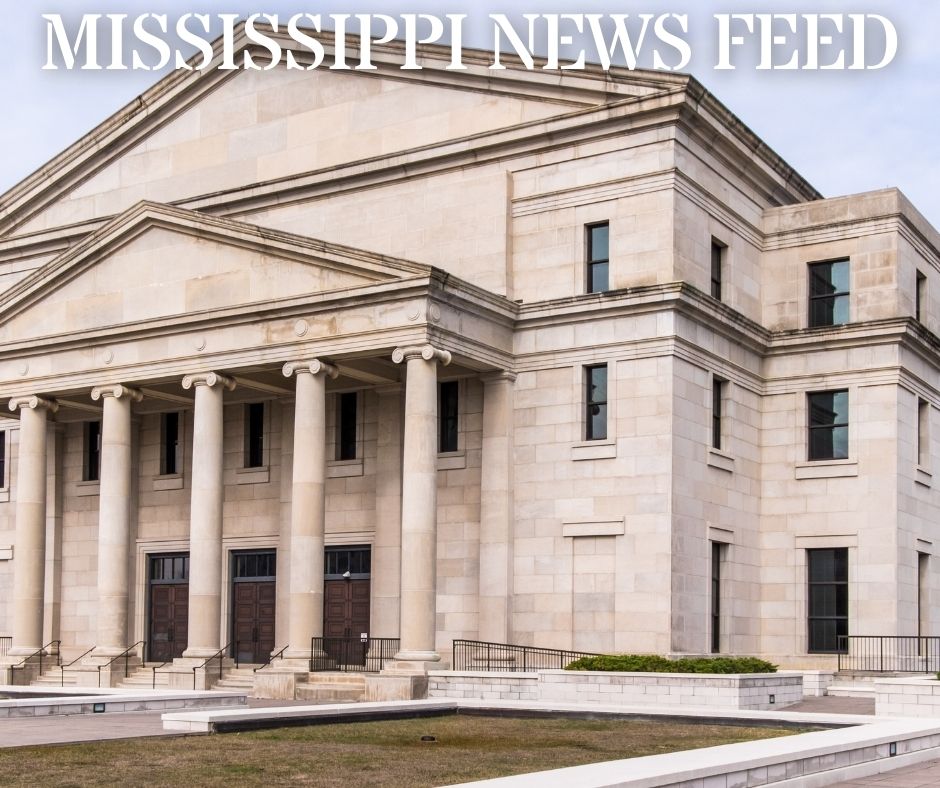Mississippi Today
Anna Wolfe wins Nellie Bly Award for Investigative Reporting

Mississippi Today investigative reporter Anna Wolfe has won the Nellie Bly Award for Investigative Reporting for her tenacious series “The Backchannel.”
Wolfe's series unearthed new evidence about former Gov. Phil Bryant's role in the state's massive welfare scandal, inspiring multiple court defendants to come forward with allegations against Bryant or publicly insist Bryant be held accountable. The series also exposed key new players in the scandal like former NFL quarterback Brett Favre, patterns of political nepotism and coercion, and damning proof that powerful figures kept millions from people who needed it most.
The findings of the series inspired legislative and congressional hearings, and a federal investigation into the misspending continues.
“I started reporting on Mississippi's welfare system with a simple but often overlooked question: What is the poorest, yet most federally funded state in the nation doing to solve poverty? Who knew getting the answer would require the very kind of innovative, dogged and brave reporting that Nellie Bly championed. I'm certainly honored to receive this award in her name,” offered Wolfe.
READ MORE: Mississippi Today's complete “The Backchannel” series
Founded in 2017, the Nellie Bly Award honors the legacy of the pioneering 19th century reporter who dedicated her career to exposing social injustice. Wolfe is the 7th annual recipient of the award. The award is announced annually on May 5th in commemoration of Nellie Bly's birthday and is presented by the Albany, N.Y.-based Museum of Political Corruption (MPC).
“By focusing on corruption and poverty, Anna seeks justice and gives a voice to her community's most vulnerable,” said MPC President Bruce Roter. “Her tenacious reporting informs and empowers the public — it carries on Nellie Bly's tremendous legacy.”
Wolfe is the recipient of numerous awards, including two Goldsmith Prizes for Investigative Reporting, the Collier Prize for State Government Accountability, the John Jay/Harry Frank Guggenheim Excellence in Criminal Justice Reporting Award, the Al Neuharth Innovation in Investigative Journalism Award, the Sidney Award, and the National Press Foundation's Poverty and Inequality Award.
“Anna more than deserves this recognition,” said Mississippi Today editor-in-chief Adam Ganucheau. “Most people now know the jaw-dropping breadth of corruption she uncovered, but what people may not necessarily know is the heart and energy she put into this reporting. She's always centered the people who were cheated out of these federal funds — Mississippians who truly needed and were entitled to help — and she let their stories guide her reporting toward the wrongdoing. Anna has poured more than five years of difficult, emotionally draining work into this project, and all Mississippians are better informed and better off because of it.”
Jerry Mitchell, director of the Mississippi Center for Investigative Reporting at Mississippi Today, received the “Nellie” award in 2022 for his reporting on corruption and abuse of power. The Museum of Political Corruption is a 510(c)(3) nonprofit, nonpartisan institution dedicated to educating and empowering the public by providing a better understanding of corruption and encouraging solutions that promote ethics reform and honest governance. The selection committee for the 2023 Nellie Bly Award included MPC Founder and President Bruce Roter, Trustee Karol Kamin, Chair and MPC advisory board members Morgan Pehme and Charles Lewis, and outside advisors Rex Smith, former Editor of the Albany Times Union, and Marc Jacob, former Metro Editor at the Chicago Tribune and Sunday Editor at the Chicago Sun-Times.
This article first appeared on Mississippi Today and is republished here under a Creative Commons license.
Mississippi Today
On this day in 1950


MAY 16, 1950

Twenty Black families from South Carolina filed the lawsuit, Briggs v. Elliott, the first direct attack on the validity of the “separate but equal” doctrine in public schools.
The litigation was later combined with the successful Brown v. Board of Education case. The litigation might never have happened if not for the Rev. Joseph A. DeLaine, who accepted the NAACP's call to challenge the school bus transportation practices in Clarendon County, where Black students had to walk up to 8 miles to school.
“I realize that the stand that I take may cost me my job as a school teacher, but we need men,” he wrote.
Property owner Levi Pearson had previously sued, asking that school buses be provided for Black students. After his lawsuit failed on technical grounds, Thurgood Marshall approached DeLaine, saying he needed families for litigation, or the NAACP couldn't go any further.
After gathering the signatures of 107 parents and their children, economic pressure and violence followed. Despite this, 17 adults signed the petition again, and the lawsuit moved forward to trial. Evidence showed that South Carolina spent $221 annually for each white student, but only $45 for each Black student. White children had modern schools with a teacher for every grade. Meanwhile, Black children studied in wooden shacks, reading textbooks discarded by white students.
As a result of their activism, the Pearson family saw boycotts of their timber, and the Briggses were fired from their jobs. So were DeLaine and his wife. They saw their home and church burned to the ground. They were forced to leave the state after a drive-by shooting. In 2003, the families of DeLaine, Levi Pearson and the Briggses received Congressional Gold Medals for their courage.
This article first appeared on Mississippi Today and is republished here under a Creative Commons license.
Did you miss our previous article…
https://www.biloxinewsevents.com/?p=358956
Mississippi Today
PSC axes solar programs in light of EPA funds, advocates file lawsuit
Advocates from some of the state's conservation groups — such as Audubon Delta, Mississippi Sierra Club and Steps Coalition — spoke out Wednesday against a recent decision by the Mississippi Public Service Commission to suspend several solar programs, including “Solar for Schools,” less than two years after the previous commission put them in place.
“This is particularly disappointing because the need for these incentives in the state of Mississippi is significant,” said Jonathan Green, executive director of Steps Coalition. “Energy costs in the South, and in particular the region known as the Black Belt, are higher than those in other parts of the country for a number of reasons. These regions tend to have older energy generation infrastructure, and housing that has not been weatherproofed to modern standards. For many low- to moderate-income residents in the state of Mississippi, energy burden and energy insecurity represent real daily economic challenges.”
The PSC voted 2-1 at its April docket meeting to do away with the programs, reasoning in part that new funds through the Inflation Reduction Act would be available to the state. About 10 days later, the Environmental Protection Agency awarded $62 million to the state, through the Hope Enterprise Corporation, to help low-income Mississippians afford adding solar power to their homes. The funds are part of the Biden Administration's Solar for All program, one of the several recent federal initiatives aimed at reducing greenhouse gas emissions.
The PSC decision ended three programs the previous commission put in place to encourage wider adoption of solar power through the two power companies it regulates, Entergy Mississippi and Mississippi Power: “Solar for Schools,” which allowed school districts to essentially build solar panels for free in exchange for tax credits, as well as incentives for low-income customers and battery storage.
Last Friday, the Sierra Club filed lawsuits in chancery courts in Hinds and Harrison counties against the commission, arguing the PSC broke state law by not providing sufficient reasoning or public notice before making the changes. Advocates also argued that new funding going to Hope Enterprise won't go as far without the PSC's low-income incentives.
The programs were part of a 2022 addition to the state's net metering rule, a system that allows homeowners to generate their own solar power and earn credits for excess energy on their electric bills. Mississippi's version is less beneficial to participants than net metering in most states, though, because it doesn't reimburse users at the full retail cost. Mississippi's net metering program itself is still in tact.
Northern District Commissioner Chris Brown said that, while he supported efforts to expand solar power, he didn't think programs that offer incentives from energy companies were fair to other ratepayers.

“It's the subsidy that we take issue with,” Brown said at the meeting. “It's not the solar, it's not the helping the schools. We just don't think it's good policy to spread that to the rest of the ratepayers.”
Brown and Southern District Commissioner Wayne Carr voted to end the programs, while Central District Commissioner De'Keither Stamps voted against the motion. All three are in their first terms on the PSC. Brown's position is in line with what the power companies as well as Gov. Tate Reeves have argued, which is that programs like net metering forces non-participants to subsidize those who participate.
Robert Wiygul, an attorney for the Mississippi Sierra Club, countered that argument during Wednesday's press conference, saying that net metering actually helps non-participants by adding more power to the grid and reducing the strain on the power companies' other infrastructure. Moreover, he said, the PSC hasn't offered actual numbers showing that non-participants are subsidizing the program.
“Look, if the commission wants to talk about that, we are ready to talk about it,” Wiygul said. “But what we got here is a situation where these two commissioners just decided they were going to do this. We don't even know what that claim is really based on because it hasn't been through the public notice and hasn't been through the public comment process.”
While no schools had officially enrolled in “Solar for Schools,” which went into effect in January of last year, Stamps told Mississippi Today that there were places in his district getting ready to participate in the very programs the PSC voted to suspend.

“My issue was we should have talked to the entities that were going through the process to (understand what they were doing) to participate in the programs before you eliminate the programs,” he said.
Several school districts in the state are already using solar panels thanks to funding from a past settlement with Mississippi Power. Officials there told Mississippi Today that the extra power generated from the panels has freed up spending for other educational needs. During the public comment period for the 2022 net metering update, about a dozen school district superintendents from around the state wrote in to support the initiative. Ninety-five school districts in the state would have been eligible for the program because they receive power from Entergy Mississippi or Mississippi Power.
Former commissioner Brent Bailey, who lost a close reelection bid in November to Stamps, was an advocate for the schools program that the PSC created while he was there. At the April docket meeting, he pleaded with the new commission to reconsider, arguing that the new federal funding won't have the same impact without those programs.
“My ask is to at least give this program a chance, see where it goes, and hear from stakeholders that have participated,” Bailey said. The solar programs, he added, weren't just about expanding renewable energy, but taking advantage of a growing economy around solar power as well: “We can just stand by and watch it go by, or we can participate in this and bring economic development to the state.”
This article first appeared on Mississippi Today and is republished here under a Creative Commons license.
Crooked Letter Sports Podcast
Podcast: In or out (of the NCAA Tournament)?

College baseball's regular season is in its last week, which means baseball bracketology is a popular activity. State needs to finish strong to become a Regional host. Southern Miss probably has already punched its ticket as a 2- or 3-seed. Ole Miss, playing its best baseball presently, needs victories, period. Meanwhile, the State High School softball tournament is this week in Hattiesburg, and the state baseball tournament comes to Trustmark Park in Pearl next week.
Stream all episodes here.
This article first appeared on Mississippi Today and is republished here under a Creative Commons license.
Did you miss our previous article…
https://www.biloxinewsevents.com/?p=358148
-
SuperTalk FM3 days ago
Martin Lawrence making 3 stops in Mississippi on comedy tour
-
Our Mississippi Home2 days ago
Beat the Heat with Mississippi’s Best Waterparks
-
Mississippi Today6 days ago
Lawmakers may have to return to Capitol May 14 to override Gov. Tate Reeves’ potential vetoes
-
Mississippi News7 days ago
Man arrested for allegedly breaking into home, robbing owner
-
SuperTalk FM7 days ago
Couple arrested after husband received unemployment benefits while in prison
-
Mississippi News Video5 days ago
Local dentists offer free dental care in Amory
-
Our Mississippi Home3 days ago
Charlie’s U-Pik: Opening Soon for the Summer Season
-
Mississippi News6 days ago
Bond set for West Point couple accused of killing their child





































